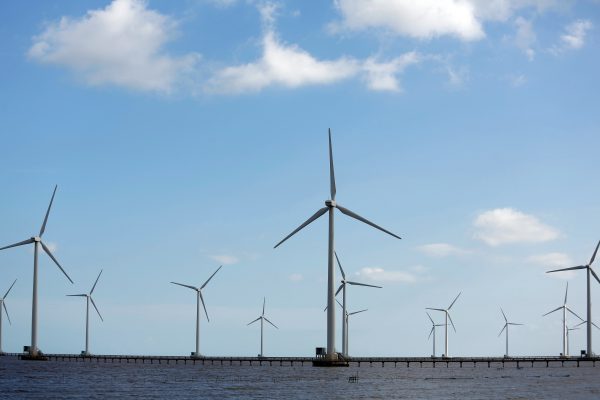Green bonds are a green financing instrument. They are a debt security that fund climate or environmental-related public infrastructure spending or private capital expenditure. But investors have raised concerns about ‘greenwashing’ — where companies make false or exaggerated statements about being green to receive investment. This can lead to financial losses and decrease investor trust. Vietnam should establish a national framework, or ‘taxonomy’, to classify green bonds based on the pre-existing ASEAN and EU regulatory approaches to limit greenwashing.
Vietnam is committed to sustainable development and hosts an emerging green bond market. At COP 26 and COP 27, in 2021 and 2022 respectively, Vietnam emphasised its commitment to combat climate change, move towards a green economy and achieve net-zero emissions by 2050.
To do this, Vietnam’s government aims to increase the amount of electricity it produces using renewable energy — including hydro, solar, wind and biomass power — from 16.8 per cent in 2022 to 33 per cent by 2030 and 55 per cent by 2050.
Vietnam has encouraged the use of green bonds. In 2016, a government-sponsored entity in Ho Chi Minh City and the Ba Ria–Vung Tau municipal government issued green bonds — worth US$23.4 million and US$3.6 million respectively. Vietnamese firms such as the Trungnam Group and Trungnam Solar Power JSC have also issued green bonds for their solar panel projects in Ninh Thuan Province. In July 2022, EVN Finance JSC issued an internationally-verified onshore green bond. The US$75 million bond received technical support from the Global Green Growth Institute and sponsorship of US$50 million from GuarantCo.
These achievements have brought international attention on Vietnam. The ASEAN Sustainable Finance State of the Market 2021 report ranked Vietnam as the second-largest issuer of green bonds among ASEAN member states. Despite this, there are no legal provisions for a green bond taxonomy or national index of green bonds in Vietnam. Without a legal framework, greenwashing can occur. Two cases internationally highlight how this problem can manifest.
First, companies can make deceptive claims about their environmental impact and mislead investors. Although Vietnam has not recorded any greenwashing cases, greenwashing scandals from other countries are a wake-up call. Repsol — a Spanish oil company — took advantage of the absence of a clear definition of a ‘green’ project to issue its first green bond in 2017. Though whether the bond enabled the company to reduce its carbon footprint is unclear. As better information becomes available, investors may no longer purchase green bonds from firms with weak green credentials.
Second, green bonds can be fungible and used to fund other non-green projects in a firm or country. Until July 2022, bond issuers in China could use up to 50 per cent of the funds from green bonds to finance general operations.
Greenwashing reduces investor trust and may lead to wasteful spending on activities which harm the environment.
In developing states like Vietnam, there is a high potential for greenwashing. This is because they are heavily reliant on foreign capital flows to fulfil long-term sustainable investments. Introducing a green taxonomy system may help the Vietnamese green bond market avoid greenwashing, encourage local businesses to comply with bond-issuance criteria and enable lenders to evaluate the green credentials of loan recipients.
Vietnam should adopt a mix of regional and international standards in its regulations. The ASEAN Taxonomy for Sustainable Finance is a good reference. It classifies the contribution of economic activities to climate change mitigation through a colour-coded system from ‘green’, to ‘amber’ and ‘red’. The taxonomy also offers sector-specific advice on green activities and investments. The EU taxonomy has a stricter standard for labelling green projects. Green projects must ‘do no significant harm’ to the environment and 100 per cent of bond funding must be used for proposed activities.
Using ASEAN and EU taxonomy rules as a reference point, Vietnam can create a green bond taxonomy system aligned with international standards but in a Southeast Asian economic context. Singapore and Indonesia have adopted the ASEAN and EU taxonomy standards in their national green frameworks. This has brought credibility to their standards which are grounded in high standards and universal principles but with the flexibility to be compatible with local contexts. If Vietnam replicates this it will be regionally competitive in attracting foreign investors.
Yet regulations that are too stringent could discourage potential debt issuers. The experience of the United States in 2018 may be informative for Vietnam in considering the balance between stringent regulations and incentives for bond issuers — the set of legislative requirements in assessing green credentials discouraged issuers from raising green bonds as they were afraid of lawsuits from accusations of non-compliance.
A green bond taxonomy will transform Vietnam’s green bond market, prevent greenwashing, make Vietnam a trusted partner for investors and raise more funds for renewable sectors. But this can only be achieved if the country integrates regional and international standards into its legal framework.
Hanh Minh Duong is a MSc in Foreign Service student, concentrating on International Development, at Georgetown University.

